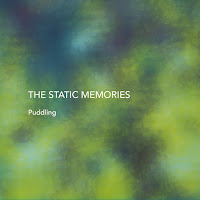Mattin
Songbook #7
Germany Munster
Records ??? LP
(2019)
This morning as the grey clouds parted, out of the murk
appeared a brand new, curious and unsolicited item from Mattin’s infamous anti-copyright
operation. At first glance, it appears
to be a document of a theatre piece of sorts; a recording of a performance at
Cologne’s Digging The Global South Festival from November 2017. This lp functions as part theatre, part
concert of improvisation, part history lesson.
As you might expect from Mattin, it is delivered, in places, with no
small amount of outrage or vitriol. Some
of this vitriol is delivered in an overdriven punk-vocal style, but at other
times, text is recited quietly and calmly, although the methods utilized for
the recording of vocals remain resolutely low fidelity. Sometimes a pitch effect is used. Texts are recited sometimes in English,
sometimes in German. Sometimes, when the
pitch effect is particularly thickly used, the meaning of the words becomes
lost entirely.
Mattin pulls together an interesting group to help him
realise this work (and claims the record was made “collectively”); artists Lucio
Capece, Marcel Dickhage and Cathleen Schuster alongside experimental musicians
Moor Mother, Colin Hacklander and Farahnaz Hatam. Capece – he of the floating balloon/speakers
soundwork EPOCHÉ - uses bass clarinet and sampler. Berlin-based Schuster and Dickhage apparently
“…engage with the contemporary
environment, evolve in dialogues and [what] could be termed as critical shaping”. Here, they are responsible for voice, sampler
and texts in German. Moor Mother is a “…self-described Afrofuturist, she uses spacetime-bending sound and lyricism to reformulate concepts of
memory, history, and the future in an afrocentric or afrodiasporic tradition”. On Songbook
#7 she uses electronics. Colin
Hacklander and Farahnaz Hatam have a pre-existing duo; Hacklander plays drums
while Hatam utilizes computer.
Hacklander is fairly prolific and
has worked with Mark Ernestus’ Jeri-Jeri and NU Unruh, while interestingly,
Hatam co-founded N.K., Berlin’s “…space
for the avant-garde and non-mainstream culture”.
In the included four-page libretto, texts from the piece
are reproduced which give an introduction to the history of revolutionary
politics of the early Twentieth Century, focussing in particular on the year
1917. The texts are printed in English
and German. Also included are lighting
notes for the stage production itself, the tracklisting – tracks are named
after the first seven months of the year – and a quote from the activist Germaine
Berton, whose visage adorns the sleeve.
Berton is infamous for having assassinated Marius Plateau, the Secretary
of the Far-Right political organization Action Française in 1923, being unable to find
her initial target, its leader Leon Daudet.
She was subsequently acquitted, but eventually died by her own hand four
days after Daudet’s own death in 1942.
My first exposure to Mattin was the Sakada 3” cd document
of his 2002 meeting with Eddie Prevost released on Confront. This was recorded at a concert in the
basement of Mark Wastell’s Sound 323 record shop in London and Mattin is
credited with “computer feedback”. As an
aside, Mattin has also worked with Mark Wastell in Belaska, whose two releases,
VAULT and Reductionism Is Dead may be hard to come by these days. For me, this record exists more as a sign
post for further research than a musical piece to listen to for entertainment,
but I’m guessing that’s partly Mattin’s intention here. So check it out yourself; do your own research. Recommended.





